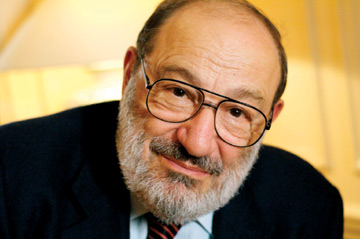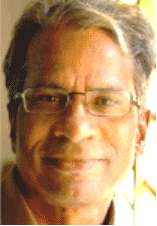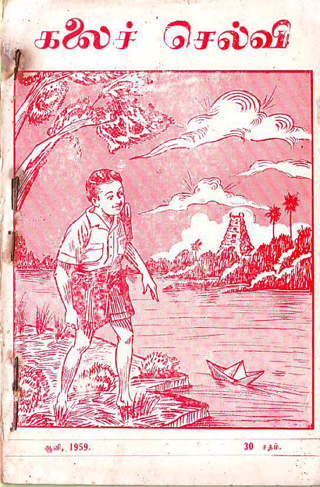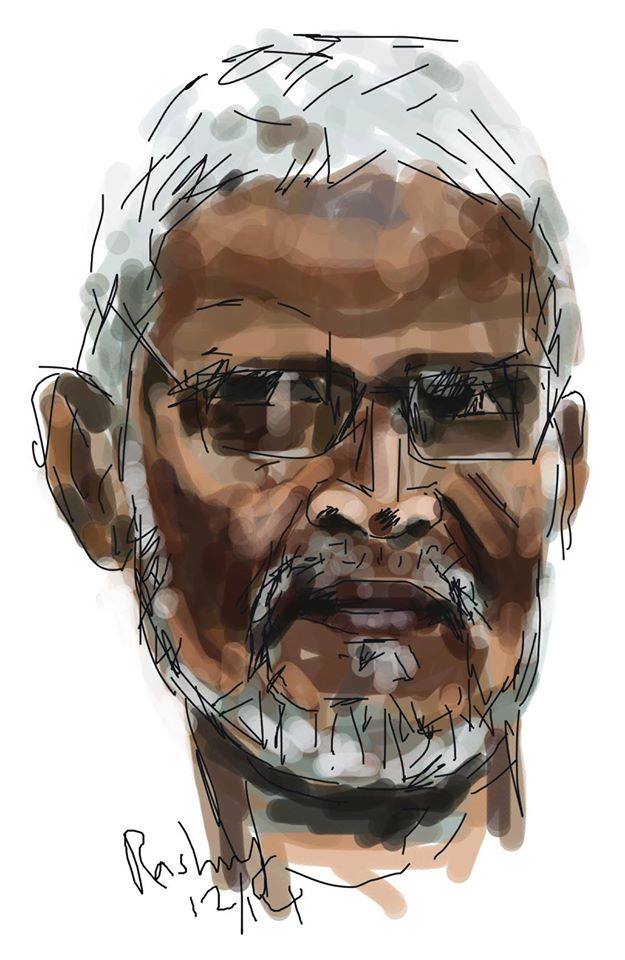அம்பர்தோ எகோ பல் துறைகளில் தன் ஆளுமையினைப்பதித்த முக்கியமானதோர் ஆளுமை. இலக்கிய விமர்சனம், ஊடகப் பண்பாடு, குறியியல், மானுடவியல், படைப்பு இலக்கியம் மற்றும் மத்தியகாலத்து அழகியல் பற்றிய…
தரமான படைப்பாளியை அவர் வாழும் காலத்திலேயே அங்கீகரித்து மரியாதை செய்வதுதான் அவருக்கு நாம் செய்யக்கூடிய குறைந்தபட்ச மரியாதை. எனவே, கவிஞர் பிரம்மராஜனை நவீன தமிழ்க்க் கவிதை இயக்கத்தின்…
 ‘கலைச்செல்வி’ சஞ்சிகை ஈழத்தில் வெளிவந்த தமிழ்ச்சஞ்சிகைகளில் முக்கியமானதொரு சஞ்சிகை. ‘தேமதுரத் தமிழோசை உலகமெலாம் பரவும்வகை செய்தல் வேண்டும்’ என்னும் தாரக மந்திரத்துடன் , சிற்பி சரவணபவனை ஆசிரியராகக்கொண்டு வெளிவந்த சஞ்சிகை அது. கலைச்செல்வி சஞ்சிகையை நினைத்தால் எனக்கு ஞாபகம் வரும் விடயம் என் மாணவப்பருவத்தில் அச்சஞ்சிகையின் ஓரிதழொன்றினை வாசித்த சம்பவம்தான். கூடவே அவ்விதழில் வெளியான சொக்கன் அவர்களின் சிறுகதையொன்றும் ஞாபகத்துக்கு வரும்.
‘கலைச்செல்வி’ சஞ்சிகை ஈழத்தில் வெளிவந்த தமிழ்ச்சஞ்சிகைகளில் முக்கியமானதொரு சஞ்சிகை. ‘தேமதுரத் தமிழோசை உலகமெலாம் பரவும்வகை செய்தல் வேண்டும்’ என்னும் தாரக மந்திரத்துடன் , சிற்பி சரவணபவனை ஆசிரியராகக்கொண்டு வெளிவந்த சஞ்சிகை அது. கலைச்செல்வி சஞ்சிகையை நினைத்தால் எனக்கு ஞாபகம் வரும் விடயம் என் மாணவப்பருவத்தில் அச்சஞ்சிகையின் ஓரிதழொன்றினை வாசித்த சம்பவம்தான். கூடவே அவ்விதழில் வெளியான சொக்கன் அவர்களின் சிறுகதையொன்றும் ஞாபகத்துக்கு வரும்.
அச்சிறுகதையின் கரு இதுதான்: தமிழ் ஆசிரியர் ஒருவரின் மகளுக்கு , அவரின் மாணவனொருவன் காதல் கடிதம் எழுதி விடுகின்றான். ஆனால் அந்தக் காதல் கடிதத்தை எழுதியவன் தன் மாணவனே என்பதை அவ்வாசிரியர் கண்டு பிடித்து விடுகின்றார். எப்படி? வழக்கமாக அவன் தமிழில் எழுதும் போது விடும் எழுத்துப்பிழையொன்றினை அந்தக் காதல் கடிதத்திலும் விட்டிருப்பான். அதிலிருந்து அந்த மாணவனை அத்தமிழாசிரியர் கண்டு பிடித்து விடுகின்றார்.
எத்தனையோ வருடங்களுக்கு முன்னர் வாசித்த எழுத்தாளர் சொக்கனின் அச்சிறுகதையினை, இப்பொழுது நினைத்தாலும் இதழ்க்கோடியில் இலேசாக முறுவலொன்று ஓடி மறையும். காதல் கடிதம் பற்றிய தமிழ் வாத்தியாரான சொக்கனின் தமிழ் வாத்தியார் பற்றிய சிறுகதையை நினைக்குந்தருணங்களில் அது வெளியான ‘கலைச்செல்வி’ சஞ்சிகையும் ஞாபகத்துக்கு வந்து விடுகின்றது.
‘கலைச்செல்வி’ சஞ்சிகையின் சில இதழ்களை நூலகம் இணையத்தளத்தில் வாசிக்க முடிகிறது.
இவ்விதழ்களில் அறிந்து கொண்ட விடயங்கள் சில வருமாறு: இவ்விதழ்களில் புதுமைப்பிரியை (பத்மா சோமகாந்தன்), , எஸ்.பொ., வ.அ.இராசரத்தினம், சிற்பி சரவணபவன், மு.தளையசிங்கம், கவிஞர் நீலவாணன், கவிஞர் பரமஹம்சதாசன், தேவன் (யாழ்ப்பாணம்), ஆதவன், அ.க.சர்மா எனப்பலர் எழுதியுள்ளார்கள். [ஆதவன் என்னும் பெயரிலும் அக்காலகட்டத்திலும் ஒருவர் எழுதிக்கொண்டிருந்திருக்கின்றார்.]
‘உனக்காகக் கண்ணே’ என்னும் தலைப்பில் நாவலோன்றினைச் சிற்பி என்னும் பெயரில் சரவணபவன் அவர்கள் எழுதியுள்ளார். அ.க.சர்மா ‘அணுவுள் ஓர் அதிசயம்’ என்னும் தலைப்பில் அறிவியற் கட்டுரைத்தொடரொன்றினை எழுதியிருக்கின்றார். எழுத்தாளர்கள் ‘எழுத்துலகில் நான்’ என்னும் தலைப்பில் தம் எழுத்துலக அனுபவங்களைப் பகிர்ந்து கொண்டிருப்பதையும் அறிய முடிகின்றது.
‘மூத்த’ எழுத்தாளர்களும், முகநூலும்!


 சமூக ஊடகங்களை அண்மைக்காலமாகப்பல மூத்த எழுத்தாளர்கள் பலர் பாவித்து வருவது ஆரோக்கியமானதொரு செயற்பாடாகவே நான் கருதுகின்றேன். இங்கு நான் பாவித்துள்ள மூத்த எழுத்தாளர்கள் என்னும் பதம் அமரர் எஸ்.பொ. அவர்களுக்குப் பிடிக்காததொரு பதம். அவருடன் ஒருமுறை ஆறுதலாக உரையாடிக்கொண்டிருந்தபொழுது ‘அதென்ன மூத்த எழுத்தாளர்’ என்று அவர் பரிகாசம் செய்தது ஞாபகத்துக்கு வருகின்றது. மூத்த என்னும் சொற்பதத்தை வயதில் மூத்த, எழுத்துத்துறை அனுபவத்தில் மூத்த என்னும் கருத்துப்பட பாவிக்கலாம் என்பதால் அவ்விதம் பாவிப்பதில் தவறில்லையென்றே கருதுகின்றேன். அதனாலேயே இங்கும் அப்பதத்தைப்பாவிக்கின்றேன்.
சமூக ஊடகங்களை அண்மைக்காலமாகப்பல மூத்த எழுத்தாளர்கள் பலர் பாவித்து வருவது ஆரோக்கியமானதொரு செயற்பாடாகவே நான் கருதுகின்றேன். இங்கு நான் பாவித்துள்ள மூத்த எழுத்தாளர்கள் என்னும் பதம் அமரர் எஸ்.பொ. அவர்களுக்குப் பிடிக்காததொரு பதம். அவருடன் ஒருமுறை ஆறுதலாக உரையாடிக்கொண்டிருந்தபொழுது ‘அதென்ன மூத்த எழுத்தாளர்’ என்று அவர் பரிகாசம் செய்தது ஞாபகத்துக்கு வருகின்றது. மூத்த என்னும் சொற்பதத்தை வயதில் மூத்த, எழுத்துத்துறை அனுபவத்தில் மூத்த என்னும் கருத்துப்பட பாவிக்கலாம் என்பதால் அவ்விதம் பாவிப்பதில் தவறில்லையென்றே கருதுகின்றேன். அதனாலேயே இங்கும் அப்பதத்தைப்பாவிக்கின்றேன்.
அந்த வரிசையில் அண்மைக்காலமாக முகநூலில் அதிகம் சந்திக்கக்கூடியவர்களிலொருவராக எழுத்தாளர் நந்தினி சேவியர் அவர்களையும் குறிப்பிடலாம். இன்னுமொருவர் எஸ்.எல்.எம் ஹனீபா. மேலும் ‘அலை’ யேசுராசா, மேமன்கவி, வி.ரி.இளங்கோவன் என்று பல ஈழத்து எழுத்தாளர்களைக்குறிப்பிடலாம். இவர்களைப்போன்றவர்களுடனெல்லாம் கருத்துகள் பரிமாறுவதைச் சாத்தியமாக்கியுள்ளது முகநூல். மேலும் பல்வேறு நாடுகளிலும் வாழும் பல்வேறு தலைமுறைகளைச்சேர்ந்த எழுத்தாளர்கள் சந்திக்குமோரிடமாக விளங்குகின்றது முகநூல். இது முகநூலின் முக்கியமான பயன்களிலொன்று. இவற்றை மூத்த எழுத்தாளர்கள் எல்லாரும் விளங்கியுள்ளார்கள் என்பதற்கில்லை. ஆனால் அவ்விதம் விளங்கிய சிலர் , இவ்விதமான சமூக ஊடகங்களை ஆக்கபூர்வமாகப்பாவிக்கின்றார்கள். இது உண்மையிலேயே வரவேற்கத்தக்கது; ஆரோக்கியமானது.
எஸ்.எல்.எம்.ஹனீபா அவர்களின் சிறுகதைத்தொகுப்பான ‘மக்கத்துச்சாலை’யினி ‘நூலகம்’ தளத்தில் வாசிக்கலாம். அதற்கான இணையத்தள முகவரி: http://www.noolaham.net/project/01/90/90.htm
நந்தினி சேவியர் அவர்களின் ‘அயல் கிராமத்தைச் சேர்ந்தவர்கள்’ சிறுகதைத்தொகுப்பினையும் ‘நூலகம்’ இணையத்தளத்தில் வாசிக்கலாம். அதற்கான முகவரி: http://noolaham.net/project/03/230/230.pdf’
‘அலை’ யேசுராசா அவர்களை அவரது எழுத்தினூடு அறிந்திருக்கின்றேன். அவருடனான கருத்துப் பரிமாறல்களைச் சாத்தியமாக்கியுள்ளது முகநூல். பதிவுகள் இடுவதுடன், அவ்வப்போது ஏனைய பதிவுகளுக்குத் தன் கருத்துகளையும் தெரிவிக்கத்தயங்காதவர் இவர்.



 For more than 30 years now, since the 80s I have been associated with the field of Neo-Thamizh Poetry and I can say with conviction that Poet Brammarajan is a pioneer in this realm, in more than one way. Form-wise and content-wise he has experimented a lot in this area. Anyone who objectively writes the history of the History of Neo-Thamizh Poetry cannot but mention Poet Brammarajan as a name to reckon with in this realm. Though I cannot claim to have understood the full texts and sub-texts of all his poems and the myriad lanes and by-lanes of the inner world through which the Poet’s mind and imagination choose to undertake a lone, wholesome voyage, the Style and Content of his poems have given me lot of new openings and poignant moments. Latha Ramakrishnan.
For more than 30 years now, since the 80s I have been associated with the field of Neo-Thamizh Poetry and I can say with conviction that Poet Brammarajan is a pioneer in this realm, in more than one way. Form-wise and content-wise he has experimented a lot in this area. Anyone who objectively writes the history of the History of Neo-Thamizh Poetry cannot but mention Poet Brammarajan as a name to reckon with in this realm. Though I cannot claim to have understood the full texts and sub-texts of all his poems and the myriad lanes and by-lanes of the inner world through which the Poet’s mind and imagination choose to undertake a lone, wholesome voyage, the Style and Content of his poems have given me lot of new openings and poignant moments. Latha Ramakrishnan.
Peguy: “There is even a Poetry which draws its brilliance from the absence of God, which aims at no salvation, which relies on nothing but itself, a human effort, rewarded on this Earth, to fill the void of Space” – Albert Camus’s Entry in his Note-Book IV.
“I took everything as seriously as if I were Immortal” – The Will / Jean Paul Sartre.
These two ‘quotable quotes’ that we find in Arindha Nirandharam [The Known Eternity], the first poem-collection of Brammarajan, a pioneer in Neo-Thamizh Poetry appeared in 1980, convey, in a sense, the very essence of his Poesy. A retired English Professor, born in 1953[bio-data given in box] he has six poem-collections and also several books on Poetry and its various aspects, to his credit, apart from a sizeable number of translated works. Right from his first collection of poems he has been writing poems in rich, experimental styles, consciously and steadfastly adhering to post-modern forms of contemporary poetry.
Writing mostly ‘open-ended’ poems he has a firm grip over the language concerned and has an unwavering conviction of What, How and Why Poetry should be. A multi-faceted personality he is, his varied interests ranging from Literature to gardening, from Music to Atoms, Travel, Painting, Books, nature Science and Technology, Mythology and a lot more and all these find a significant place in his poems, forming the inter-textual components of his poetry and give it a splendid neo-poetic form and content. Further, one can hear the voice of a rebel too, not in the direct, political sense, but in a more subtle and psychological sense, defying the Order of the Day, so to say, whereby the mediocre becomes the monarch.



